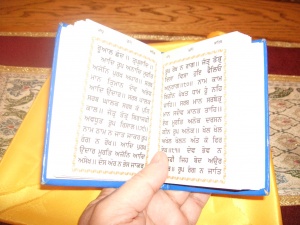Japji Sahib Ji: Difference between revisions
Hari singh (talk | contribs) No edit summary |
Hari singh (talk | contribs) No edit summary |
||
| Line 1: | Line 1: | ||
{{Japji Sahib Menu}} | {{Japji Sahib Menu}} | ||
The above menu allows you to select each [[Pauri]] (section) of this most important [[Sikh]] holy [[Bani]]. You can read this [[Gurbani]] in English text with English translation. Also by clicking on '''''Play Audio''''' at the top of the screen, you can listen to the Gurbani in [[Gurmukhi]]. | |||
Choose from one of the following 40 options: | |||
*'''M| 1 | 2 | 3 | 4 | 5 | 6 | 7 | 8 | 9 |10|11|12|13|14|15|16|17|18|19|20|21|22|23|24|25|26|27|28|29| 30| 31| 32| 33| 34| 35| 36| 37| 38| S'''.<br><br> | |||
*'''M''' stands for Mool Mantar, | |||
*'''1 to 38''' represents the 38 Pauris from number 1 to 38 and | |||
*'''S''' stands for the final Salok. | |||
'''Start reading and listening to this Bani now by clicking on ''M'' on the above Menu and then click on ''Play Audio''.'''<br><br> | |||
[[Image:Gutka7.JPG |thumb| Read Gurbani |right]] | |||
'''Japji Sahib''' consists of the ''[[Mool Mantar]]'', a set of 38 [[Pauri]]s (hymns) and a final ''[[Salok]]''. This [[Bani]] called Japji Sahib, appear at the very beginning of the Sri [[Guru Granth Sahib]] from Page 1 to Page 8 in the [[Holy Book]] of the [[Sikh]]s. It is regarded as the most important [[Bani]] or 'set of verses' by the Sikhs and is recited every morning by all practising faithful of this religion. The word ‘Jap’ means to ‘recite’ or ‘to ‘chant’. ‘Ji’ is a word that is used to show respect as is the word ‘Sahib’. | '''Japji Sahib''' consists of the ''[[Mool Mantar]]'', a set of 38 [[Pauri]]s (hymns) and a final ''[[Salok]]''. This [[Bani]] called Japji Sahib, appear at the very beginning of the Sri [[Guru Granth Sahib]] from Page 1 to Page 8 in the [[Holy Book]] of the [[Sikh]]s. It is regarded as the most important [[Bani]] or 'set of verses' by the Sikhs and is recited every morning by all practising faithful of this religion. The word ‘Jap’ means to ‘recite’ or ‘to ‘chant’. ‘Ji’ is a word that is used to show respect as is the word ‘Sahib’. | ||
Revision as of 04:59, 23 June 2005
| [[{{{1}}}|<Previous]] | Japji Sahib Ji | |
[[{{{2}}}|Next>]] |
| Page {{{3}}} |
M 1 2 3 4 5 6 7 8 9 10 11 12 13 14 15 16 17 18 19 20 21 22 23 24 25 26 27 28 29 30 31 32 33 34 35 36 37 38 S |
Page {{{3}}} | |
The above menu allows you to select each Pauri (section) of this most important Sikh holy Bani. You can read this Gurbani in English text with English translation. Also by clicking on Play Audio at the top of the screen, you can listen to the Gurbani in Gurmukhi. Choose from one of the following 40 options:
- M| 1 | 2 | 3 | 4 | 5 | 6 | 7 | 8 | 9 |10|11|12|13|14|15|16|17|18|19|20|21|22|23|24|25|26|27|28|29| 30| 31| 32| 33| 34| 35| 36| 37| 38| S.
- M stands for Mool Mantar,
- 1 to 38 represents the 38 Pauris from number 1 to 38 and
- S stands for the final Salok.
Start reading and listening to this Bani now by clicking on M on the above Menu and then click on Play Audio.
Japji Sahib consists of the Mool Mantar, a set of 38 Pauris (hymns) and a final Salok. This Bani called Japji Sahib, appear at the very beginning of the Sri Guru Granth Sahib from Page 1 to Page 8 in the Holy Book of the Sikhs. It is regarded as the most important Bani or 'set of verses' by the Sikhs and is recited every morning by all practising faithful of this religion. The word ‘Jap’ means to ‘recite’ or ‘to ‘chant’. ‘Ji’ is a word that is used to show respect as is the word ‘Sahib’.
This Bani was composed by the founder of the faith, Sri Guru Nanak Dev Ji who was the first of ten human Gurus of this faith. The Ten Gurus of Sikhism were responsible for the creation of this faith which took place over period 1469 to 1708 - a period of about 239 years. At the point when the last of these Gurus departed this Earth, the Guruship was passed to the Sikh Holy Book, the SGGS. The Sikh treat the SGGS as a living Guru and the respect shown for the Shabad or ‘Message of the Gurus’ is unique in this religion.

